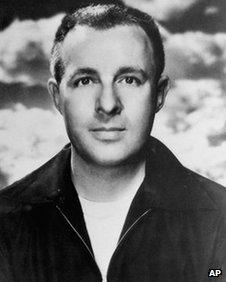Author Ray Bradbury dies, aged 91
- Published
- comments
Ray Bradbury told Terry Wogan his writing talent came from his prolific memory and "voices inside my head"
Author Ray Bradbury has died in Los Angeles at the age of 91.
His daughter Alexandra confirmed that her father died on Tuesday night in Southern California.
Bradbury wrote hundreds of novels, short stories, plays and television and film scripts in a career dating back to the 1940s.
His most famous novels include Fahrenheit 451 and Something Wicked This Way Comes.
The writer's grandson, Danny Karapetian, said: "He influenced so many artists, writers, teachers, scientists, and it's always really touching and comforting to hear their stories.
"His legacy lives on in his monumental body of books, film, television and theatre, but more importantly, in the minds and hearts of anyone who read him, because to read him was to know him".
Tributes have been paid by famous fans of the writer, Moon director Duncan Jones mourned <link> <caption>"another amazing sci-fi visionary gone".</caption> <url href="http://www.bbc.co.uk/news/entertainment-arts-18346773" platform="highweb"/> </link>
Bradbury was born in Illinois, and as a teenager moved with his family to Los Angeles.
For three years after leaving school he earned a living selling newspapers, writing in his spare time.
From the early 1940s, his short stories started to appear in magazines like Weird Tales, Astounding Science Fiction and Captain Future.
In 1947, he married Marguerite 'Maggie' McClure and published his first book, Dark Carnival.
Three years later, Bradbury began to establish his reputation with The Martian Chronicles, a collection of stories about materialistic Earthmen colonising and ruinously exploiting Mars.
His most celebrated novel, Fahrenheit 451, published in 1953, depicts a future society in which books are banned.
The story, which gets its title from the temperature at which paper supposedly ignites, proved to be uncannily prophetic - the characters are addicted to television soap operas, while miniature headphones, known as "ear thimbles", provide a constant stream of music and news.

Bradbury preferred his work to be called "fantasy" rather than "science fiction"
A film version, directed by Francois Truffaut, was released in 1966.
For years, Bradbury tried to prevent the publication of Fahrenheit 451 as an e-book. He told the New York times that electronic books "smell like burned fuel" and called the internet "a big distraction".
"It's meaningless; it's not real. It's in the air somewhere," he said.
But he relented in 2011, when his publishing deal was renewed. His agent said: "We explained the situation to him, that a new contract wouldn't be possible without e-book rights. He understood and gave us the right to go ahead."
Bradbury also wrote several works for film and television. He wrote the screenplay for John Huston's film Moby Dick and scripts for many TV series, including Suspense, The Alfred Hitchcock Show and The Twilight Zone.
Bradbury was passionate about literature. In 2008, he told The National Endowment for the Arts: "If you know how to read, you have a complete education about life, then you know how to vote within a democracy.
"But if you don't know how to read, you don't know how to decide. That's the great thing about our country - we're a democracy of readers, and we should keep it that way."
The author had four daughters - Susan, Ramona, Bettina and Alexandra. His wife died in 2003.
- Published30 November 2011